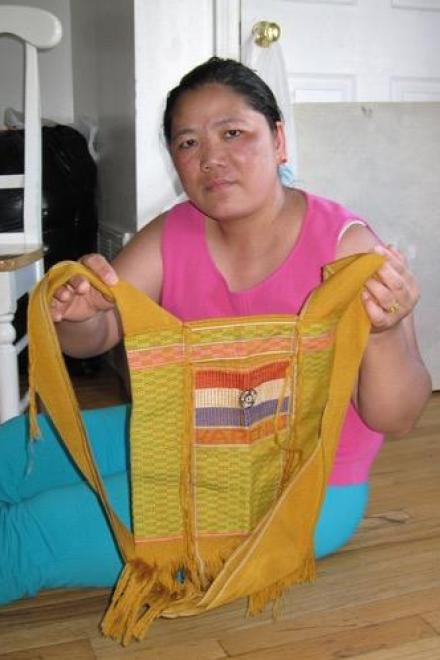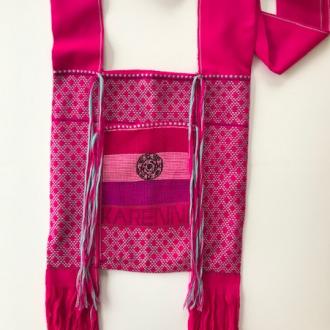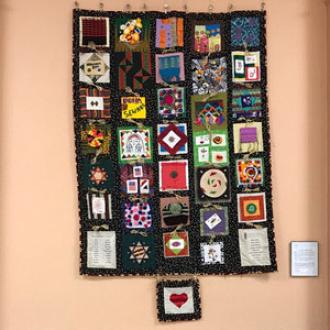
Hsa Meh, now in her forties, is an accomplished back strap weaver and tote bag creator originally from Burma, a nation that is sometimes called Myanmar. Refugees in Worcester from Burma often prefer that older word to the military elite’s neologism, “Myanmar.” She joined RAW in 2013. Hsa Meh and her family are from the Karenni ethnic minority. There are several Karenni families living in Worcester now, many including relatives of several generations living together. Hsa Meh and her household were forced to flee their home village in Burma due to attacks by the central government’s army, the Tatmadaw. When Hsa Meh was young they fled to a U.N.-sponsored refugee camp along the Burma/Thai border and lived there for many years.
Conditions in the refugee camp were harsh; families would have to build and then continually re-build their own houses from bamboo and other forest products. Food was markedly insufficient and had to be dangerously supplemented by clandestine treks outside the camp fences into the jungle to collect honey and hunt small mammals to eat. Thai soldiers would patrol the camp borders and residents were not supposed to go into the forest. Schooling options in the camp were very poor; teachers were often under-trained and sometimes would beat the pupils with a bamboo switch if they made mistakes on quizzes.
Karenni women in the camps often earned a bit of cash by working as home health aides (doing well-baby checks, for instance, for the camp clinic) or by making crafts which the camp staff then sold to outside markets. Hsa Meh took the latter path and refined her backstrap weaving skills in the camp craft house.
We learned from a 2017 interview in her then-apartment in a triple decker in South Worcester (Rodgers and Umunna 2017) that back in the camp craft house some of her weavings were quite elaborate and incorporated many Karenni traditional motifs. She had learned how to weave in the refugee camp from her sister. Weavers in the camp made multiple products including ceremonial Karenni costumes, wide blankets, scarves, and tote bags. She has carried over the latter textile product to her cloth work in Worcester. She makes large, practical tote bags edged in fringe at the bottom, often with insets of contrastive patterns in bright colors.
She told us that such bags were used to haul fruits and vegetables back in the camp. People would place the straps on their foreheads and the bag would be suspended down their upper backs (a common practice in many parts of wider Southeast Asia). In Worcester the buyers drape the bags over a shoulder and probably use the bags to carry books, lunch, snacks, and all manner of small objects hard to tote along by hand. Has Meh’s favorite tote bag colors were yellows and pinks at the height of her bag-making activities for RAW.
It is interesting that the textiles Hsa Meh made in collaboration with RAW once she moved to Worcester as a refugee were simpler in design, with a reduced number of motifs, in comparison to the ones she made back in the camps. As well, she no longer made the full range of cloth products that she did back in the camp craft house. This ‘simplification trend’ in her weaving work goes against another pattern for RAW artisans: an actual increase in complexity and fineness of technique in RAW, for many artisans in Worcester.
Hsa Meh did her weaving work with RAW in addition to her 40-hour workweek at a local envelope factory. Given that heavy daily schedule she no longer weaves or makes tote bags for sale. She and her family have now moved to Grafton, MA and own their house.

